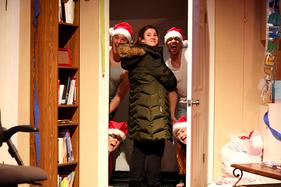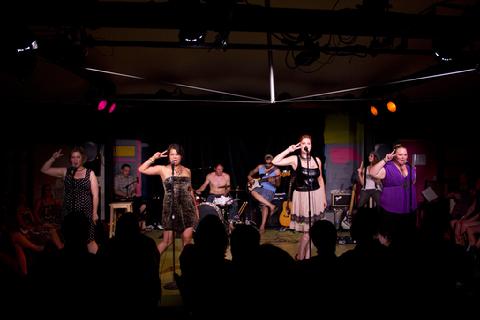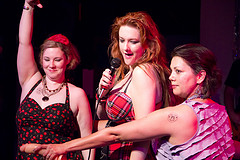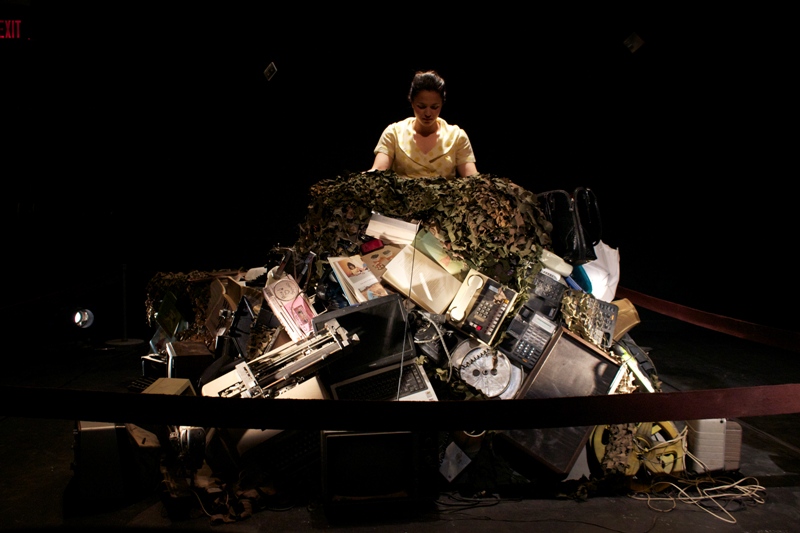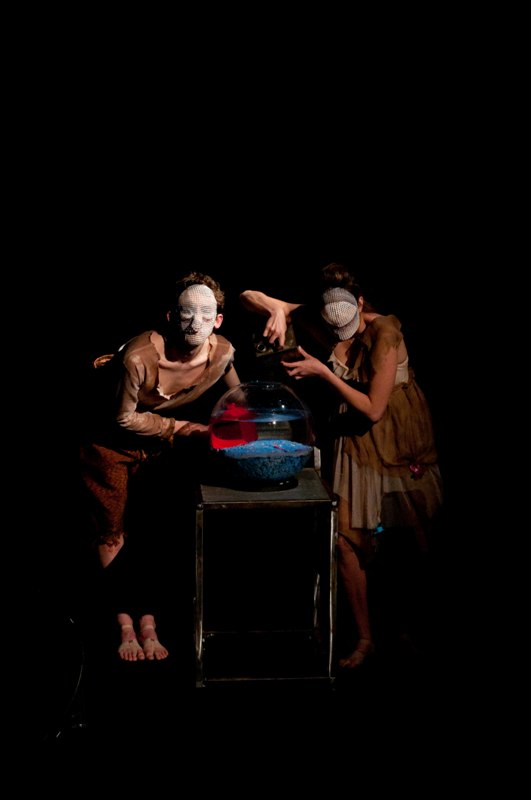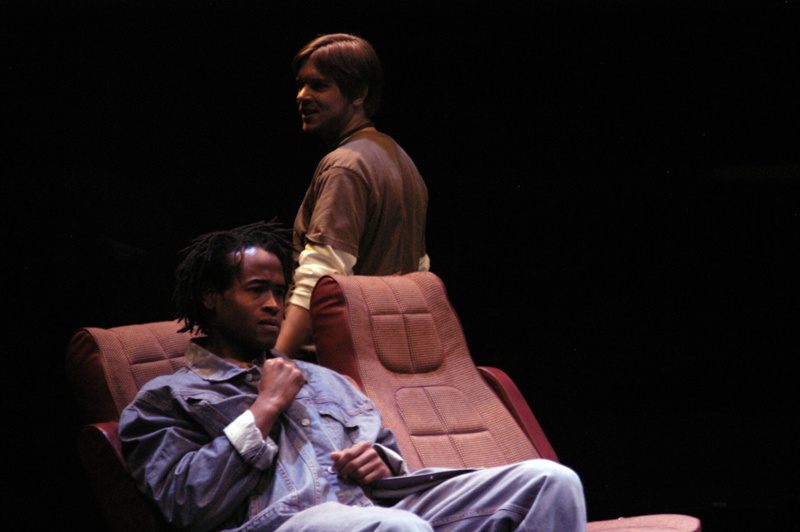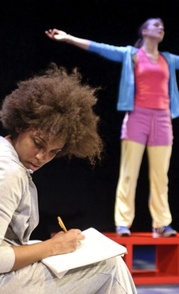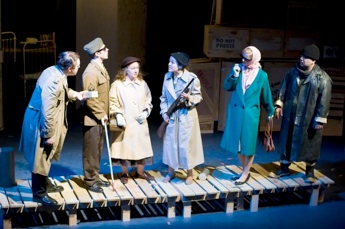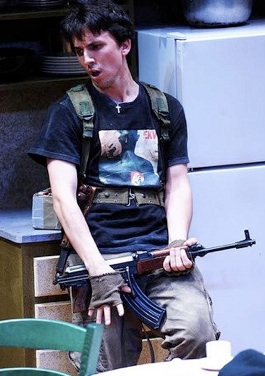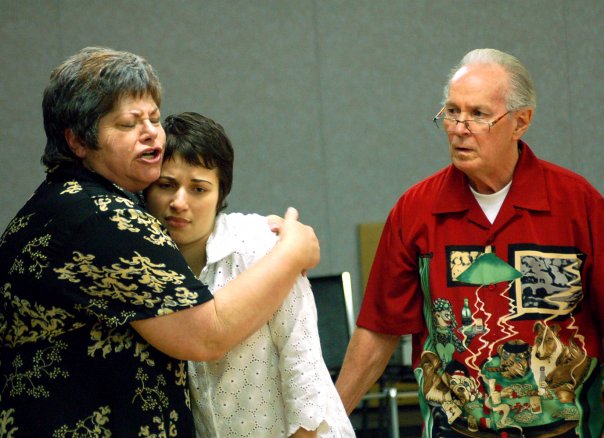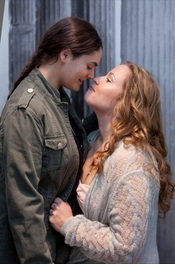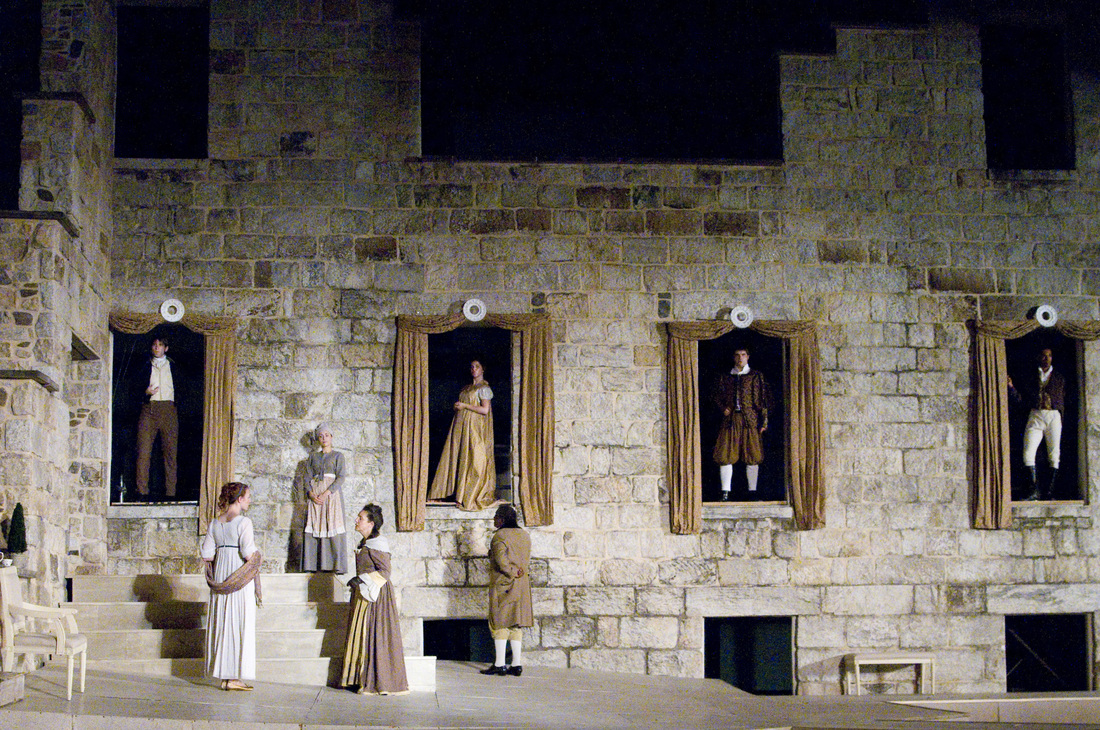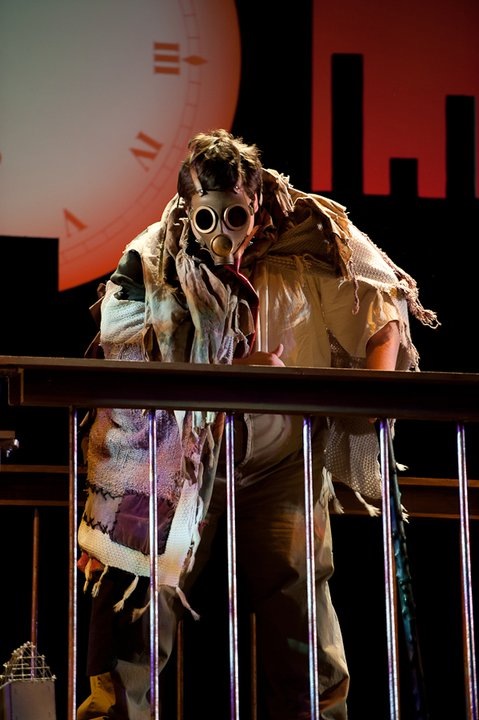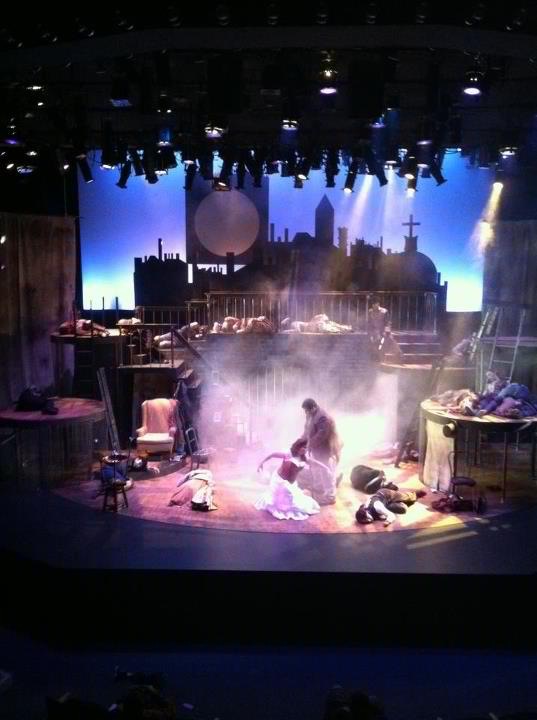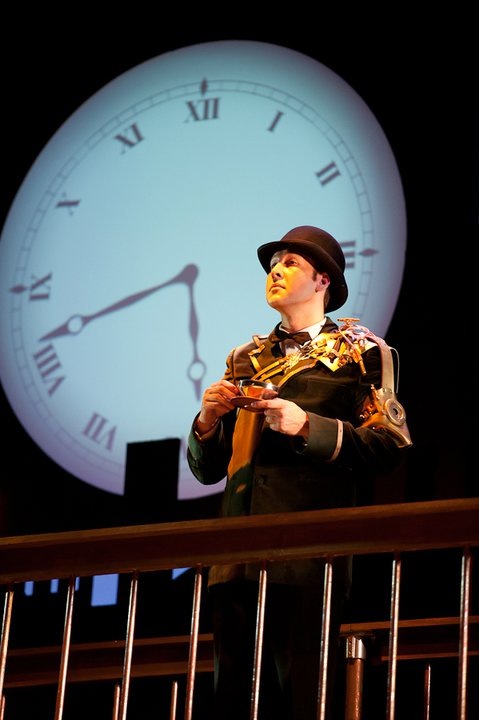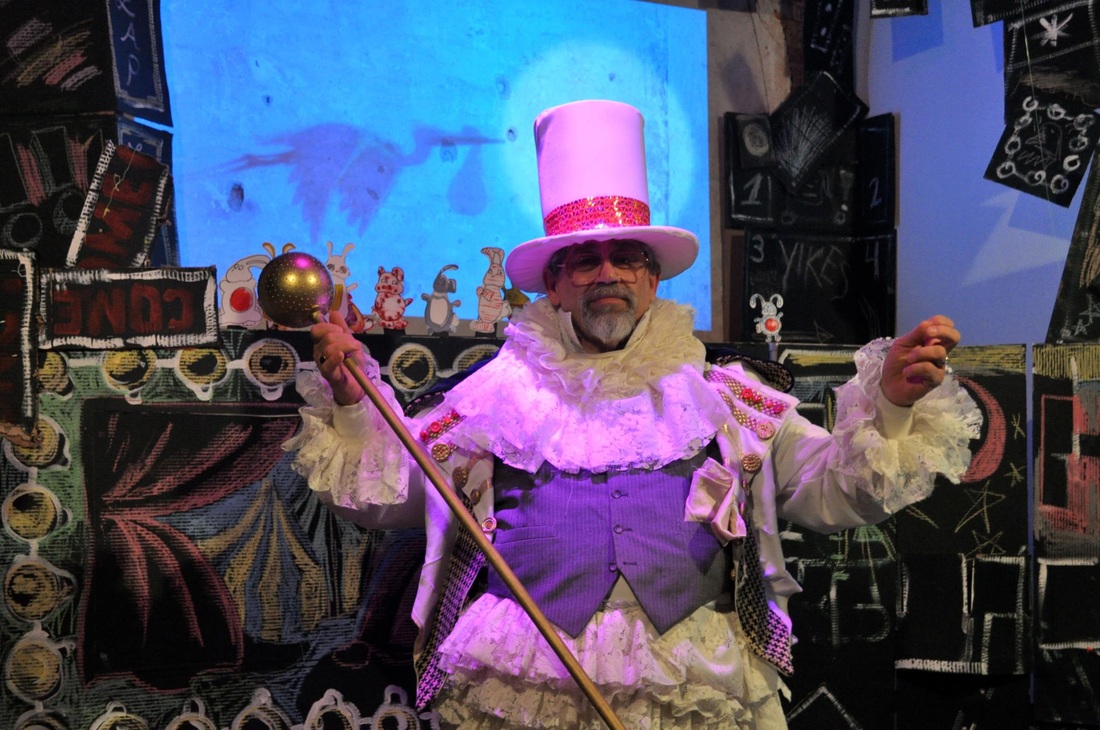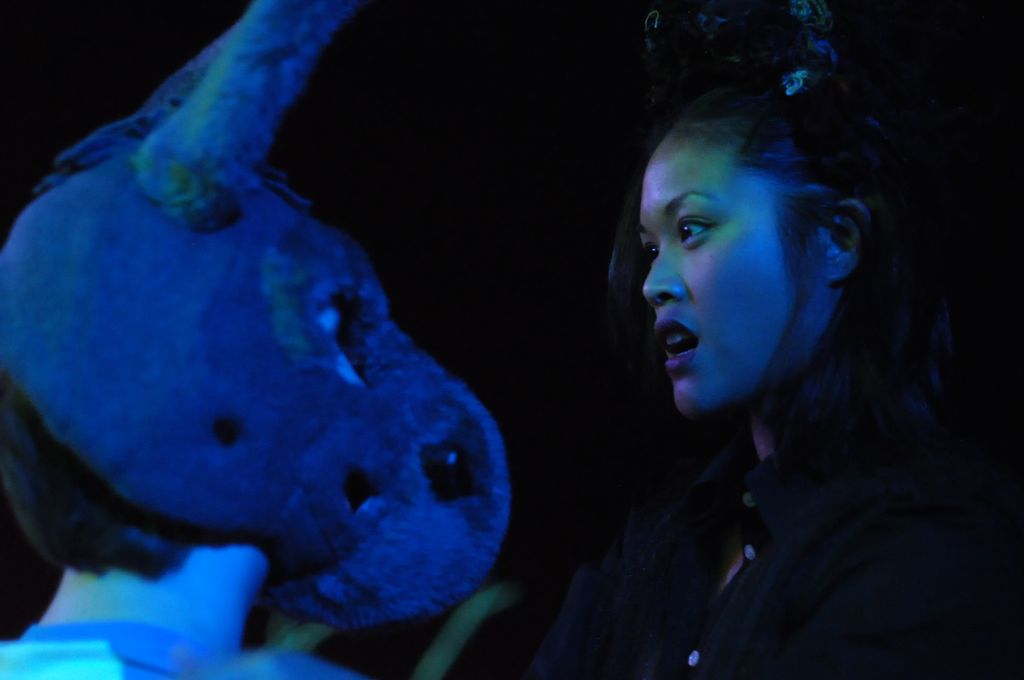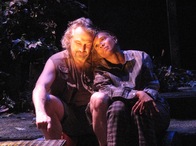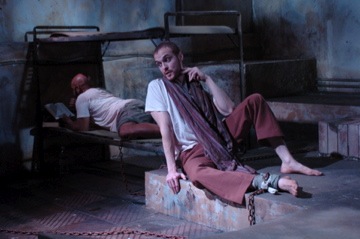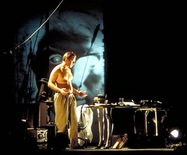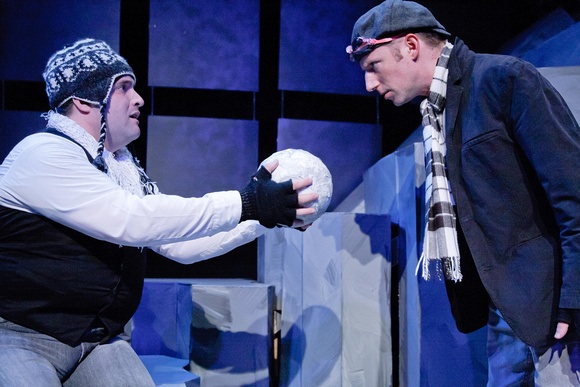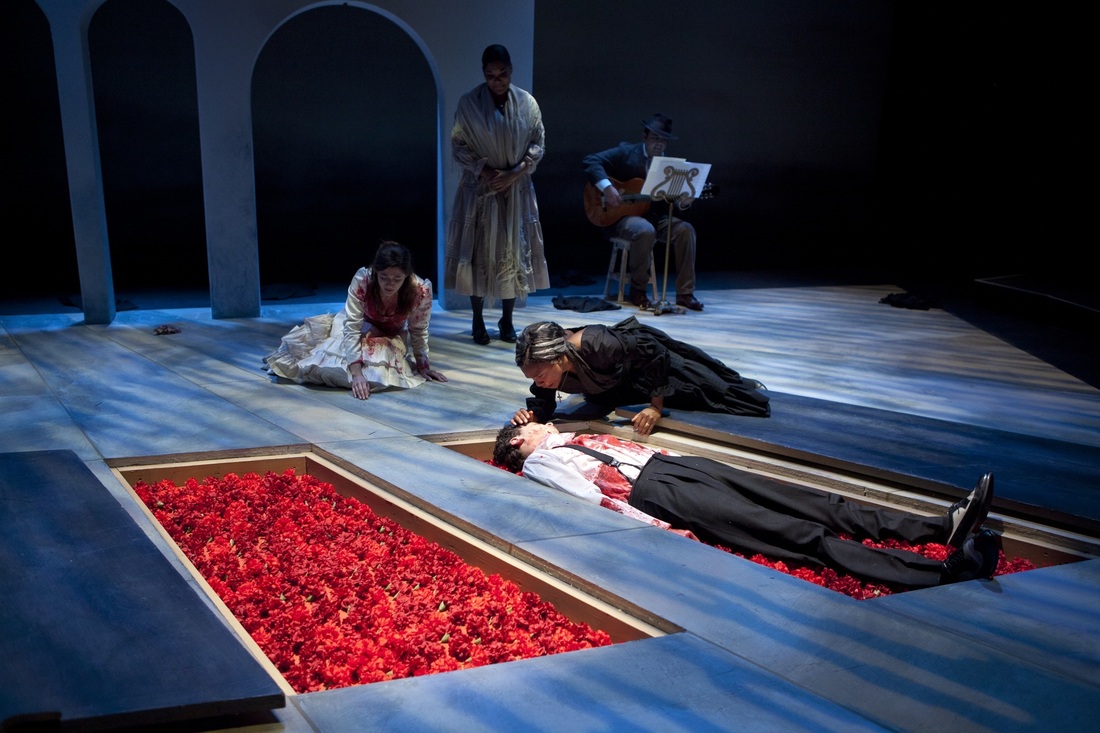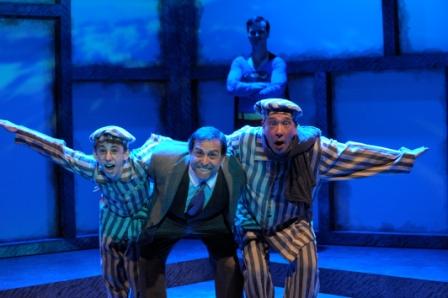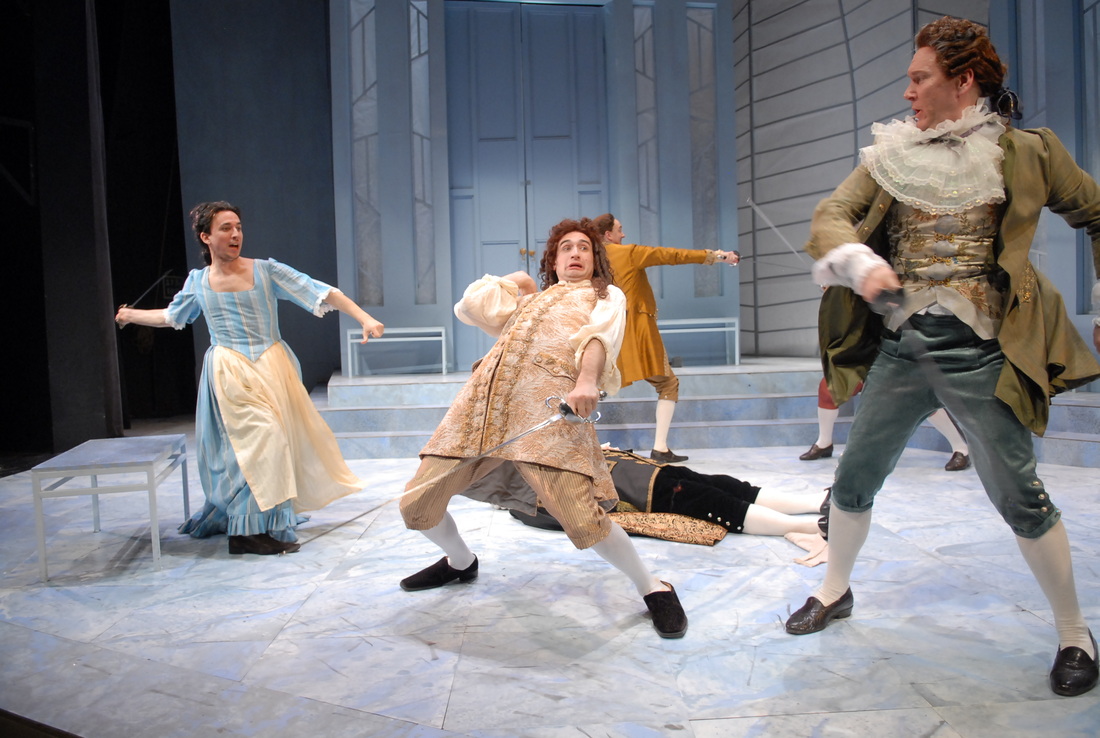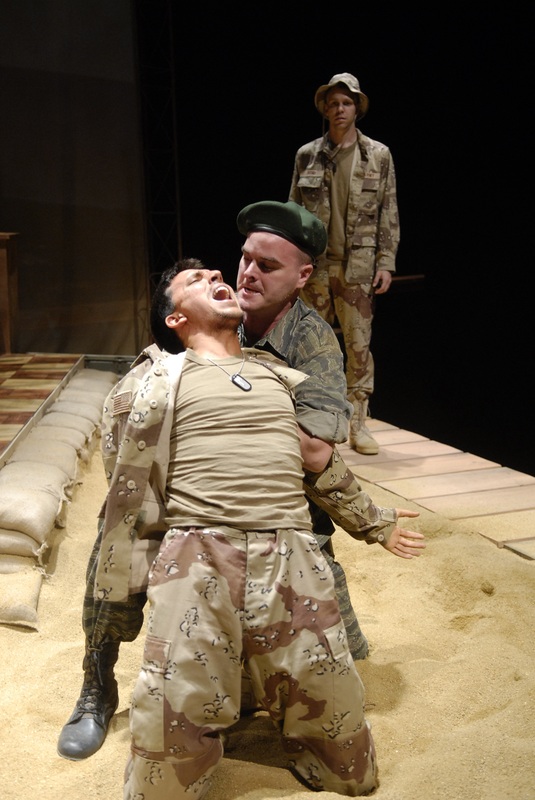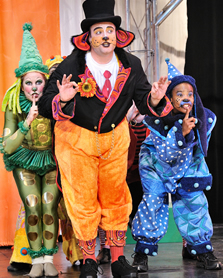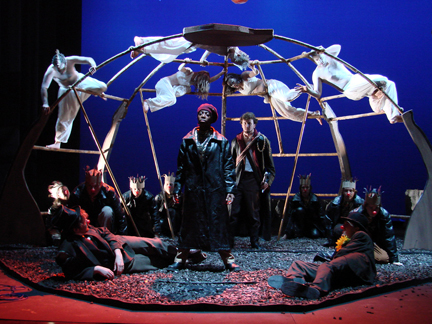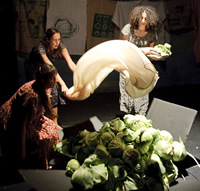|
Jacqueline Lawton: What was the first play that you ever directed? What did you learn from that experience that remains with you today?
Toni Rae Salmi: My first play was ‘Dentity Crisis by Christopher Durang my senior year in college. I learned to trust my instincts when it came to a myriad of things, but comedy and casting come to mind first. I also learned that in all actuality, the director does NOT have all of the power. There’s always someone with a bit more who might control some strings that you were not aware of. At that point, it was the faculty, but in later years, it’s your artistic director or producer that might have a final say in how a production goes. JL: Why did you decide to get into theatre? Was there someone or a particular show that inspired you? TRS: My story is not unique: I saw a play and thought to myself, “I can do that,” and proceeded to put myself out there. It came fairly naturally to me, at least the acting part, but it wasn’t until I was cast as Lady Macbeth in college did I realize that to be fully satisfied with your work onstage you REALLY had to do your homework. Looking back I wish that my school offered a “how to market yourself as a director” course, or took the time to focus on that. I went to a smaller school, and was on the academic track in grad school so I never learned how to do that; then again, I'm not sure if schools offer it. JL: What kind of work do you do to pay the bills? How do you balance this work with your work as a director? TRS: I oversee educational programs and research for a trade association in Northern Virginia. I have responsibilities and travel quite a bit, so it gets more challenging when my day job is busy. Getting a directing gig at the beginning of the year through early spring is ideal, because that’s the slow period for my day job, but it never seems to work out that way, and I still manage to pull it off! But as the years go by, I know there IS a balance you have to strike, so sometimes you have to say no. I say no more on the directing side unfortunately because I DO have to pay the bills. JL: In DC, we have the Capital Fringe Festival, the Intersections Festival, the Source Festival, the Kennedy Center's Page-to-Stage Festival, the Black Theater Festival, and the Hip Hop Theatre Festival. We also have the Mead Lab at Flashpoint Theater Lab Program. Have you participated in any of these? If so, can you speak about your experience? TRS: I have directed twice for Pinky Swear: the award-winning Cabaret XXX: Les Femmes Fatales and Cabaret XXX: Love the One You’re With. I also performed in both shows. First let me say I do not recommend this. I keep saying I won’t do it and then I get roped back in, but I am determined to not be swayed in the future. Your focus is too split and neither position gets the full attention it deserves. Anyway, since the shows were both so successful, my Fringe experience was great! Sure it was hot in the tent and the conditions were never ideal and we had to conform to strict set and light parameters, but once you are aware of those parameters, it’s such a fun atmosphere and such great audiences that all the challenges are easily forgotten, at least from a performance/production perspective. JL: How many plays have you directed in the DC area? How many of them were written by women? By playwrights of color? How conscious are you selecting plays by women or people of color when deciding your season? TRS: Both Fringe Cabarets could be categorized as devised pieces, with the focus entirely on the female experience. Carol’s Christmas was written by local female playwright Marni Penning. All of Pinky Swear’s plays have been written by women and I believe that won’t be changing too much in the future. JL: How do you feel the DC theatre community has addressed the issues of race and gender parity? How has this particular issue impacted you and your ability to work? TRS: As someone who is half-Filipino, I do identify as a person of color. I can only address what I know and that is that the Asian-American theatre folk are struggling to get some group back together; I hope to be a part of that when it happens. In regards to work, as an actor, I think it most definitely has impacted my ability to work, but as a director, I haven’t been doing it that much here so it really hasn’t affected me. JL: If you could be direct at any theatre in DC, which would it be and why? TRS: Taffety Punk! Because I k now and love them and know that I would get AMAZING performances from them. Plus, I like their style, their bravery and their “bring it to the people” attitude. A few years ago I might have named a bigger theatre, but that’s not where my head is these days. JL: DC audiences are ... TRS: A motley bunch and will surprise you. You cannot assume the stoney-faced grandma in the front row is not having a good time J JL: DC actors and designers are ... TRS: Hungry for more work and willing to do whatever you ask of them. JL: DC playwrights are ... TRS: Not recognized enough. JL: DC critics are ... TRS: Critics. And EVERYONE is a critic, so if you hate or can’t take criticism, you’re going to be a very unhappy person in this business. JL: What advice do you have for an up and coming DC based director or a director who has just moved to D.C.? TRS: There is something for everyone here. SEE EVERYTHING, then decide your path. Accept that you’re going to have to get a day job. I can count on one hand those theatre folk I know who don’t have a day job. And welcome to a friendly nurturing community! JL: What's next for you as a director? Where can we keep up with your work? TRS: Well, since I'm in a show with Hub Theatre this summer, I won’t be involved with Fringe, but more than likely I will be directing something for Pinky Swear next season. I haven’t really put myself out there for other companies but I would welcome the opportunity.
0 Comments
Jacqueline Lawton: Why did you decide to get into theatre? Was there someone or a particular show that inspired you?
Jess Jung: When I was six years old my mother took me and a group of my friends to see Snow White and the Seven Dwarves at a local theatre. I had never been to the theatre before. I remember flashes – walking into the foyer, sitting in the audience, a green light on stage, feeling scared, feeling as though my body was being lifted from my seat, a blackout, being forced to say hi to the actor who played Snow White, embarrassment, astonishment at the fake wrinkles drawn on the Wicked Witch’s face. It was all so magical. A couple years later I decided that my neighborhood friends and I were going to put on our own Snow White. I spent hours upon hours, days, and then weeks getting everything prepared. I sat obsessively in front of the TV transcribing Disney’s Snow White into my wide-ruled notebook. I held “auditions” and announced the cast. I hand stitched Snow White’s cleaning skirt from old dishrags and scraps. I fabricated the wishing well from a stool (turned upside-down), butcher paper and paint. I even learned how to play “Some Day My Prince Will Come” on my mother’s piano. Unfortunately my friends soon lost interest with my obsession and we never made it past the first scene, but that did not dissuade me. I was unabashedly dedicated to the magic I experienced during my first encounter with the theatre. JL: What was the first play that you ever directed? What did you learn from that experience that remains with you today? JJ: The first project I directed was for a student work’s festival at my undergraduate institution. I had just started developing interest in directing and was obsessed with the plays of Jane Martin. I decided to direct a scene from Anton in Show Business (as every student was only given a 10-15 minute time slot). I wasn’t entirely sure how to direct at that time, but I was excited to take the reins. It was the first time I experienced the actor-director relationship from that end – and I learned about the importance of collaboration. JL: What kind of work do you do to pay the bills? How do you balance this work with your work as a director? JJ: I work as a teaching artist for multiple theatres to pay the bills. This can be tedious as I spend a great deal of my time in transit. However, I do enjoy getting to work in my field and (hopefully) inspiring another generation of theatre artists. A few of the companies I teach for have also employed me as a director (YPT, Adventure Theatre MTC, and Imagination Stage). This helps balance work and artistry. JL: In DC, we have the Capital Fringe Festival, the Intersections Festival, the Source Festival, the Kennedy Center's Page-to-Stage Festival, the Black Theater Festival, and the Hip Hop Theatre Festival. We also have the Mead Lab at Flashpoint Theater Lab Program. Have you participated in any of these? If so, can you speak about your experience? JJ: I currently serve as Associate Producer of the Source Festival. This is a new title and I’m extremely excited to have joined the team. I have the great pleasure of reading plays, recruiting staff, and managing casting. I also am working with Jenny McConnell Frederick to launch the Source Festival’s first design internships. This is sometimes a difficult post to coordinate with my teaching and directing schedule. However, I wouldn’t have it any other way as I love to be a part of a theatre’s vision. JL: How many plays have you directed in the DC area? How many of them were written by women? By playwrights of color? How conscious are you selecting plays by women or people of color when deciding your season? JJ: I’m still new to the DC area. I’ve directed for Inkwell, Adventure Theatre, Imagination Stage, Kleckography at Rorschach, and YPT. I have not been able to pick the play for any of these projects. I am extremely interested in plays written by women. It is important for me to tell female stories and I hope this will be apparent as my work develops in DC. JL: How do you feel the DC theatre community has addressed the issues of race and gender parity? How has this particular issue impacted you and your ability to work? JJ: I don’t think I’ve been in DC long enough (1 year) to answer this question – sorry. JL: If you could be direct at any theatre in DC, which would it be and why? JJ: Woolly. They are hip, diverse, and always pushing towards innovation. JL: DC audiences are ... JJ: In love with Shakespeare and musicals! JL: DC actors and designers are ... JJ: Lovely, open-minded collaborators. JL: DC playwrights are .. JJ: Witty. Smart. Sassy. JL: DC critics are ... JJ: Oh…just like critics in every city. JL: What advice do you have for an up and coming DC based director or a director who has just moved to D.C.? JJ: I feel I am still this. However, I would say – don’t be afraid to reach out to people you admire. The DC theatre community is surprisingly open and willing to embrace new artists. See lots of theatre and send lots of emails to the artists you want to collaborate with. Then be patient – which is about where I am in this newbee process. JL: What's next for you as a director? Where can we keep up with your work? JJ: I’m directing Grandfather Frost and the Snow Maiden by Michael Bobbitt for Adventure Theatre MTC in collaboration with the Hillwood Museum. After that, please check out my website jessjungdirecting.com Jacqueline Lawton: What was the first play that you ever directed? What did you learn from that experience that remains with you today?
Jessica Lefkow: The first play I ever directed was, ‘Crimes of the Heart’, in New Delhi. We had arranged for Shakti Shailini, the only shelter for battered women in the north of India, to receive a huge chunk of the box office profits- enough to buy a van for their street theater troupe. The troupe was comprised of the women themselves, who had lived through beatings, burnings, and- for many- the loss of their children and family identities. They would set up in town squares and begin to play out their own, true stories, soliciting feedback from the crowd that would inevitably gather, in an attempt to start a conversation about domestic violence. It was for many of them the first time they had appeared in public, much less to speak- and then to speak of events that were supposed to be hidden away from view! When the Shakti Shailini troupe attended our dress rehearsal- women who in spite of profound loss on so many levels were open and cheerful and so curious about our work- we brought out the remains of the prop birthday sheet cake to share with them after the performance. The women broke with all sincerity into a fractured, gentle but warm ‘Happy Birthday’ for the actor playing Meg. When they finished... There was nothing to say but, ‘thank you’. JL: Why did you decide to get into theatre? Was there someone or a particular show that inspired you? Jessica Lefkow: I first got seriously into theater as a lazy teenager looking for a good excuse to hang out after school for hours, (a bunch of us students ran an independent theater company out of the basement of the school building) and to not do my homework. Very quickly, I started to work harder at theater than at any other thing! JL: What kind of work do you do to pay the bills? How do you balance this work with your work as a director? Jessica Lefkow: Until this year, I was the primary parent for my three sons, while their dad brought home the salary that pays for the roof and the insurance. His was also the job which we followed around the planet for 17 years. That said, I’ve taught, done voice-over and coaching jobs between directing and performing gigs, and am always working on something. JL: In DC, we have the Capital Fringe Festival, the Intersections Festival, the Source Festival, the Kennedy Center's Page-to-Stage Festival, the Black Theater Festival, and the Hip Hop Theatre Festival. We also have the Mead Lab at Flashpoint Theater Lab Program. Have you participated in any of these? If so, can you speak about your experience? Jessica Lefkow: I’ve directed for nearly every Capital Fringe Festival until this year, (and performed and produced there, too.) I’ve also worked in the Page-to-Stage and Source Festivals. Each of them is a glorious mess in its own way. I love these festivals for the abundant opportunities they provide for running into the unexpected, from new production companies to actors fresh to DC stages, to directors, designers and playwrights testing out fresh ideas and collaborations. JL: How many plays have you directed in the DC area? How many of them were written by women? By playwrights of color? How conscious are you selecting plays by women or people of color when deciding your season? Jessica Lefkow: I've directed 18 full productions in the DC area. eleven of those have been by women, none by people of color- though I have directed work by playwrights of color when Iwas living elsewhere.I think I'm probably more conscious of gender than color, though I am aware of the cultural or ethnic differences between playwrights that may not be about color. I'm always pleased to direct plays in voices less represented in the mainstream, but rarely consider gender or ethnicity above other things unless asked to by the producing company. JL: How do you feel the DC theatre community has addressed the issues of race and gender parity? How has this particular issue impacted you and your ability to work? Jessica Lefkow: Our community speaks with more comfort about gender than race, as does our society. Unlike many industries, however, ours should be a destination for conversations about these and other issues with which we grapple. Even we theatre-makers do a better job addressing these issues in our work than we do when we do as ‘civilians’- we need the theatre as much as our audiences do! I embrace all the things which I can bring to the table- my identity is comprised of my gender and ethnicity as much as by my interests, knowledge and experiences. I have experienced being excluded from the creative table on the basis of both my race & my gender when living in other cultures. Here, I believe that my gender registers much more often than not, and occasionally my race as well, as a defining directorial qualifier on some level. As long as this is true, my ability to work will of course be impacted. Perhaps on some level this is okay, as our community strives to tell a variety of stories through many lenses. This is not to say I don’t mind the present reality, where the impact is arguably much more negative than positive; I do, and very much so! Women and people of color are still too often seen in the American conversation as offering an ‘other’- as opposed to ‘another’- point of view. I’ve definitely failed throughout my life to fulfill expectations of how a woman ‘should’ react, or should behave & speak, and I do think that this has impacted my career. JL: If you could direct at any theatre in DC, which would it be and why? Jessica Lefkow: Helen Pafumi of the Hub has both passion and an idiosyncratic ear for the poetry of so much new work. I know few producers whose seasons are so motivated by the sheer love of the material. I gain new perspective about every play that I’ve discussed with her, and every play I’ve seen at her theatre- usually something that I have or would have overlooked. That’s the best kind of daunting. JL: DC audiences are ... Jessica Lefkow: Partisan. JL: DC actors and designers are ... Jessica Lefkow: Invariably hard-working. JL: DC playwrights are ... Jessica Lefkow: Growing in number and distinctive voice. JL: DC critics are ... Jessica Lefkow: Becoming more skilled as a group at commentary, thank heavens! JL: What advice do you have for an up-and-coming DC based playwright or a playwright who has just moved to D.C.? Jessica Lefkow: Find the playwrights! This is an incredibly collegial town, and I am inspired by the conversation and support I see amongst the playwrights I know here. JL: What's next for you as a director? Where can we keep up with your work? Jessica Lefkow: I’ll be directing the reading of a triptych of plays by Allyson Currin, Renee Calarco and Jason Odell Williams for Pinky Swear Productions on October 21. Look for me at www.dogandponydc.com or keep up with current productions on the news page of www.jessicalefkow.com Jacqueline Lawton: Why did you decide to get into theatre? Was there someone or a particular show that inspired you?
Ty Hallmark: I’m a lifer. I’m the kid that did the church musicals and school plays and realized I could make an audience laugh. That revelation happened when I was about 7 years old and I’ve identified myself as a storyteller, in some way, ever since. JL: What was the first play that you ever directed? What did you learn from that experience that remains with you today? TH: Although I did not know what to call it then, I did a devised piece for my senior project at Rhodes College. I gathered a playwright, a group of actors and some musicians and together we built a performance that explored my difficulty grappling with the Holocaust and the whole “why does God let bad things happen to good people” question. It stirred conversation on my campus and won me several end of the year awards. For a long time, I considered it my best work. I’m happy to have moved on but I still approach any show I direct as a collaborator - one piece of a large puzzle that creates a beautiful picture when complete. JL: What kind of work do you do to pay the bills? How do you balance this work with your work as a director? TH: I always joke that, when you included my theatre work, I have three jobs. There’s the day job that pays the bulk of the bills – I’m the Records Coordinator for an education and healthcare law firm in Washington DC. Then there are my soul satisfying/egg money jobs – from April thru October, I work as a guide for Washington Walks. I lead tours through Lafayette Square Park, Dupont Circle and, starting next year, Woodley Park and the National Cathedral. My full-time employers have always been great about flexibility, allowing me time for auditions and tech week. Several have even come to see my shows. It is a very difficult balance and, especially as I get older, I cannot maintain the constant schedule. I make sure to take breaks every year, for several weeks, sometimes months at a time and I’m more discerning about the offers I accept. I used to feel like I had to do everything that was asked of me but I’m definitely better about saying no and feeling good about that decision. In whatever capacity, as actor, director or educator, I know I’m a life-long artist so I’m no longer in any sort of rush to pack my resume. Giving myself and my family breathing room increases the quality of work I eventually sign up to do. JL: In DC, we have the Capital Fringe Festival, the Intersections Festival, the Source Festival, the Kennedy Center's Page-to-Stage Festival, the Black Theater Festival, and the Hip Hop Theatre Festival. We also have the Mead Lab at Flashpoint Theater Lab Program. Have you participated in any of these? If so, can you speak about your experience? TH: The Fringe Festival has been the backbone of my professional experience in the DC area. Before Fringe, I was biding my time in community theatre and not plugged into the scene in DC at all. Fringe changed all of that. I participated in every festival for the first five years either as an actor, director, producer or stage manager and sometimes all of those at once. There have been years when I was a crazy person and did two shows at Fringe. I met the majority of my future collaborators through these projects and nicely, some of my closest friends too. JL: How many plays have you directed in the DC area? How many of them were written by women? By playwrights of color? How conscious are you selecting plays by women or people of color when deciding your season? TH: 4.5 with another one on the way next summer. The .5 is counting my experience as an Assistant Director of Pride & Prejudice this past summer with Chesapeake Shakespeare Company (CSC). Our director, Isabelle Anderson, is generously collaborative and I was definitely not a “sit back and watch” Assistant Director in any kind of way. To date, I’ve directed one show written by a woman – an original script by the same playwright who helped with the senior project I spoke of earlier. Coming into directing as an actor, I think I gravitate toward plays that have great roles for women regardless of the playwright’s gender. I’m looking forward to working with a diverse population of artists in the future though. That’s one thing I truly love about living and working in DC. JL: How do you feel the DC theatre community has addressed the issues of race and gender parity? How has this particular issue impacted you and your ability to work? TH: It’s definitely an ongoing conversation. I see it often on Twitter and Facebook and I know the Washington Post wrote about it recently. I sense more and more that artists in DC are making opportunities happen for women and minorities. Theatre J, Forum Theatre and PinkySwear Productions come to mind. I haven’t yet felt this impacting my work directly though, as a woman, I feel it instinctively every day. I’m betting I question myself more and perhaps don’t as aggressively chase opportunities as my male counterparts. JL: If you could be direct at any theatre in DC, which would it be and why? TH: As a newbie director, this is my favorite question! Hopefully some of the powers that be are listening … I’d love to assist at Constellation or Forum Theatre. Both are inclined toward ensemble work though stylistically they are very different. I love anything Allison Stockman directs because it feels like watching her imagination explode on stage. I love the images she creates and I suspect she thinks about directing in a way similar to me. Forum chooses scripts wisely and with diversity in mind. I sense directors have a lot of freedom in staging and crafting the story. That really appeals to me. I’m also hoping I’ll have a chance to direct at CSC. I’m very drawn to their use of environment in staging and I have a few stories in mind that would fit well there. JL: DC audiences are ... TH: Enthusiastic, engaged, educated, open-minded JL: DC actors and designers are ... TH: Collaborative, supportive, wildly talented JL: DC playwrights are … TH: Ingenious, to be celebrated and showcased JL: DC critics are ... TH: Part of the conversation JL: What advice do you have for an up and coming DC based director or a director who has just moved to D.C.? TH: See theatre. Assist. Self-produce. Go to an open rehearsal. Direct a reading. Sign up to audit a cattle call audition. Be part of the social media conversation. Ask a director you admire to meet up for a drink and a chat. We’re a very welcoming, integrated community and we love new ideas and passions. JL: What's next for you as a director? Where can we keep up with your work? TH: Well, first I make a return to acting. I’ll play Sylvia in CSC’s Two Gentlemen of Verona directed by Patrick Kilpatrick. I’ve been cast in this role for literally two years so I’m excited to get it off the ground. After that I’m directing a series of Chekhov’s short scenes for Pallas Theatre Collective. It’ll go up at the Fringe Festival in July and then have a short run at DCAC in August. I’m also involved in a long term directing project with LiveArt. Kevin Finkelstein is writing the script, titled Causality, and we’re just beginning conversation with actors. I have a website that I’m actually pretty good about maintaining (tyhallmark.com) and you can find me on Facebook and Twitter. Jacqueline Lawton: Why did you decide to get into theatre? Was there someone or a particular show that inspired you?
Heather McDonald: The first play I directed was David Mamet's "American Buffalo" in college. I was quiet, bookish, plump and in the hurly burly of louder more aggressive directors choosing actors for projects, I was left with a young man with cerebral palsy, a six foot four linebacker from the football team and one of two African American students in the drama program. No one expected us to pull off a wild, funny, violent, visceral production where we smashed the set apart at every performance. It was exhilarating. What I learned is that it is great fun to direct voices that are very different from mine own as a writer. And that you never know what performance somebody might have inside of them. JL: What was the first play that you ever directed? What did you learn from that experience that remains with you today? HM: Two shows that inspired me - Deborah Warner's production of "King Lear" by KICK Theatre Company at The Edinburgh Festival. Simple, ferocious, passionate, wild. And FEN by Caryl Churchill directed by Les Waters at The Public Theatre. The stage was a field of dirt and scenes in an office or a living room were plopped right down there in the dirt. I loved that! JL: What kind of work do you do to pay the bills? How do you balance this work with your work as a director? HM: The work I do to pay the bills ... hmm, I was going to say playwriting but that pays about 3 cents an hour. I teach at George Mason University. I do other kinds of writing from time to time, librettos, rewrite work, film, television, I get asked to do workshops, now and then I've won fat grants, I hope my mother nominating me for the MacArthur "genius" award will eventually pay off! JL: In DC, we have the Capital Fringe Festival, the Intersections Festival, the Source Festival, the Kennedy Center's Page-to-Stage Festival, the Black Theater Festival, and the Hip Hop Theatre Festival. We also have the Mead Lab at Flashpoint Theater Lab Program. Have you participated in any of these? If so, can you speak about your experience? HM: I've worked at the Source Festival and have mentored projects from GMU students at Fringe and done several page to stage projects via TFA and also taught for years at the Kennedy Center Playwrights Bootcamp thing sponsored by Gregg Henry. JL: How many plays have you directed in the DC area? How many of them were written by women? By playwrights of color? How conscious are you selecting plays by women or people of color when deciding your season? HM: I directed at Round House, Signature, a lot at TFA (Theater of the First Amendment) that just closed after 20 years (sigh), workshop at Woolly Mammoth, and just did devised piece at The Lansburgh Theatre. I've directed lots of readings and workshops and college and university productions. Mostly new work, contemporary and my own. Quite a few by women. "Women of color ..." I was asked to direct Jennifer Nelson's last play but was unavailable and that made me sad because I adore her and I loved her play. Many times, I've gone after particular plays or projects that didn't work out. I don't consciously choose projects by women. I'm drawn to a voice that is different than my own as a playwright. I love the opportunity to work on a big canvas, thus the college and university productions. I like pieces that have some bold theatrical or visual element. JL: How do you feel the DC theatre community has addressed the issues of race and gender parity? How has this particular issue impacted you and your ability to work? HM: Plays written and directed by women are few. There was recently an article about how many women are directing in London. That was encouraging. But it really wasn't very long ago that Garry Hynes and Julie Taymor won Tonys for directing and they were the first women to do so in their respective categories. Kathryn Bigelow winning the Academy Award for "The Hurt Locker." Just a couple years ago. I mean, I think Sofia Coppola was the first woman director to even be nominated. I think a lot of this comes from deeply outmoded ideas about what leadership looks like. JL: If you could be direct at any theatre in DC, which would it be and why? HM: For me, it's more the play or the project, but I would like to direct at a theatre that would employ me. JL: DC audiences are ... HM: smart, savvy and a bit conservative in their tastes. JL: DC actors and designers are ... HM: the best, the absolute best. JL: DC playwrights are .. HM: a supportive, strong community in the making. JL: DC critics are ... HM: meh ... no comment. JL: What advice do you have for an up and coming DC based director or a director who has just moved to D.C.? HM: My advice would be to get to know playwrights and the acting pool here. And do anything Gregg Henry asks you to do. JL: What's next for you as a director? Where can we keep up with your work? HM: I'm more of a remembering-myself writer mode these days. I've been focused for many years on other peoples' work and have turned inward to my own worlds. My directing energies go into my students. I do a big, BIG, Ten Minute Play Festival every year. This year will mark my 7th as Artistic Director. It involved over 100 people last year. I'm hoping to get into a program next summer that will allow me to do collaborative work/devised/built work with a group of artists like I did with STAY. I'm in talks about a couple projects for next year when my youngest daughter leaves for college. One, a workshop, the other a full production. I'm tossing lots of things into the air and trust one of that will be caught. Jacqueline Lawton: What was the first play that you ever directed? What did you learn from that experience that remains with you today?
Elissa Goetschius: The Skriker by Caryl Churchill. The biggest lesson from that show was the importance of allowing my vision to shift as I worked with designers and actors. Adam Kielman (composer) and Johanna Kirk (choreographer) came in with incredibly smart reactions to the script that were entirely different from what I was expecting. I learned to trust myself to take time to understand how their visions differed from and fit together with mine. My role is to guide, not dictate. It’s okay to not have all the answers from the start. If you do, you’re probably not going to create a terribly interesting production. JL: Why did you decide to get into theatre? Was there someone or a particular show that inspired you? EG: I’ve always loved theatre - I grew up going to Toronto to see Les Miz, Phantom, Into the Woods, etc. with my mother and aunt. But it was going to Stratford, Ontario and seeing Stephen Ouimette’s Richard III was the real tipping point. It was a thrilling performance at the center of a fabulous production - directed by the Artistic Director at the time, Richard Monette. It began my obsession with Shakespeare and solidified for me that theatre was and is my field. JL: What kind of work do you do to pay the bills? How do you balance this work with your work as a director? EG: My first three and a half years in DC were spent working at Woolly Mammoth. I started as Howard’s assistant, then transitioned to the literary department when I went on staff. When I moved to literary, I had to set aside directing goals as literary required my full attention. But I learned a tremendous amount working with directors like Rebecca Taichman, Anne Kauffman, Daniel Aukin, John Vreeke, and Pam MacKinnon and playwrights Kirsten Greenidge, Sarah Ruhl, Jason Grote, Melissa James Gibson, David Adjmi, Peter Nachtrieb, Sherry Shephard-Massat, Sheila Callaghan, Noah Haidle, and Bridget Carpenter. As I realized I was happiest in the rehearsal hall and that I was more a director than a dramaturg (at least in the way our industry current divides responsibilities, I’m not picking that argument in this interview) I realized I needed to leave my job at Woolly to pursue my real passion. So I spent the next three and a half years working at Open City in Woodley Park as a server and barista. It’s a great restaurant run by the same folks who run Tryst, The Diner, and the newly-opened Coupe. I would open the restaurant at 6am, worked until noon or 2pm, then work on theatre projects in the evenings. It was manageable until tech weeks and openings. Then I would get tired to the point of losing my words. After a year of trying to balance this work with regular directing gigs (all of which happened to be in Baltimore), I’ve decided to take a step back, recharge, and take a new approach to a directing career. Meaning, I’m currently applying to grad programs. We’ll see how that goes in this next chapter. JL: In DC, we have the Capital Fringe Festival, the Intersections Festival, the Source Festival, the Kennedy Center's Page-to-Stage Festival, the Black Theater Festival, and the Hip Hop Theatre Festival. We also have the Mead Lab at Flashpoint Theater Lab Program. Have you participated in any of these? If so, can you speak about your experience? EG: I’ve directed two shows for Page-to-Stage. This past year, I worked with Taffety Punk on a reading of Liz Maestri’s new play Somersaulting, an adaptation of the graphic novel by Sammy Harkham. In 2009 I directed a reading of A Brief Narrative of an Extraordinary Rabbits by C Denby Swanson which I later directed at the EMP Collective in Baltimore. While it’s a great way to expose audiences to new plays and new playwrights, my biggest takeaway is just how much you miss out on when you only experience a reading of a play compared to a full production. I should be grateful for the opportunity - and I am - but it makes me realize the value of a full production. JL: How many plays have you directed in the DC area? How many of them were written by women? By playwrights of color? How conscious are you selecting plays by women or people of color when deciding your season? EG: From the group of artists involved in the projects I worked on in roughly the last year, there were three women and four playwrights of color. And six white men. And one female playwrights of color who dropped out of a project during the process. I’ve also spent the last two years developing a strong working relationship with DC playwright Liz Maestri, but we haven’t produced a show together yet. So the demographic breakdown isn’t too shabby. When I’m looking for projects that I am personally interested in directed, I don’t look at the demographic information of the playwright first. But when it comes to pitching projects or planning a season (having helped plan seasons at Woolly and Forum and having recommended plays to many other organizations over the years) I definitely try to share plays by women and playwrights of color whenever possible. (Ask me! I have lots of plays and writers to pitch!) The questions behind season planning are something I’ve been thinking about a lot lately with the rash of seasons popping up across the country that feature entirely white-male playwrights and directors. It’s depressing. I’ve been working on a blog post for some time now, creating a fictional season for a mid-sized theatre company and extrapolating season planning guidelines for these issues. Planning my imaginary season was the easy part - writing the blog post is taking a while. Ultimately it comes down to the priorities of an Artistic Director. How much do you value telling diverse stories and inviting diverse audiences into your theatre? Are you willing to take a “risk” by producing something that’s not a “name brand”? I tend to think it’s a larger risk to continue to program the same shows, or kinds of shows, and to further alienate potential audience members. I mean, look at how well Joe Dowling’s Christopher Hampton festival turned out. Link to the Star Tribune article: http://m.startribune.com/entertainment/?id=179578081 JL: How do you feel the DC theatre community has addressed the issues of race and gender parity? How has this particular issue impacted you and your ability to work? EG: Not terribly well if you look at the statistics on the current season helpfully compiled by Gwydion (http://www.suilebhan.com/2012/11/08/final-numbers-playwright-demographics-2012-13-dc-theater-season/). We can do better. It’s embarrassing that we aren’t. We should be embarrassed. JL: If you could be direct at any theatre in DC, which would it be and why? EG: I wanna play in the Cradle at Arena. It’s a gorgeous space, but I haven’t seen anything there since the #newplay festival when they presented work from the Rude Mechanicals and the Foundry (Provenance of Beauty was amazing). I’d want to do something like The Curious Walk of the Salamander by Kirsten Greenidge (commissioned by Woolly years ago, but never produced) or That Pretty Pretty; Or the Rape Play by Sheila Callaghan. JL: DC audiences are … EG: Intelligent and open-minded. JL: DC actors and designers are … EG: Awesome. Though I would extend that to the others artists in the area as well - pulling in visual artists on theatre projects and musicians is incredibly rewarding and we have a bunch of those in DC. JL: DC playwrights are … EG: Deservedly becoming more well-known. Young DC directors should track them down and get to know them - you might not be the right collaborator for all of them, but they’re a diverse bunch and you might find your One. JL: DC critics are … EG: Incredibly supportive in the best way possible. They don’t coddle artists and truly want them to succeed. Shout out to Peter Marks for being so engaged on twitter. JL: What advice do you have for an up and coming DC based director or a director who has just moved to D.C.? EG: Stay focused on the work you want to do. Connect with artists - playwrights, designers, etc. Build your network. Don’t be stingy about introducing people, offering suggestions for resources, etc. But be careful about spending too much time on work that benefits others more than you. If you join a company be completely blunt about what you want to get out of your time spent working with them. Are you going to help organize auditions? Help with fundraising? Help with props? Great. Do you want to direct a reading? A show? Get a solid answer on whether this will happen or not. Be blunt and upfront. It makes things easier in the long run. It’s a lesson that takes a long time to learn and implement. I’ve spoken with far more experienced people who are still struggling with this issue. Also, don’t take every opportunity that you’re offered. If I don’t like a script, I don’t do my best work. You want to be proud of all of your projects. And don’t forget about Baltimore. It’s not that far away and yes, it might be a pain to get up there on a regular basis, but their scene is amazing and totally different from DC. Get to know the EMP Collective - they straddle both cities and can help with introductions. Tell Carly Bales I sent you. JL: What's next for you as a director? Where can we keep up with your work? EG: I’m currently taking a #hermityear: applying for grad school programs and reading all of the books I’ve accumulated on my shelves over the past several years. I’m also working on a new project with La Maestri and tossing ideas around with a few other favorite collaborators in the DC and Baltimore area. You can find me on twitter at @egoetschius. And I’m in the process of creating a website, but in the meantime you can follow my tumblr at egoetschius.tumblr.com. Jacqueline Lawton: What was the first play that you ever directed? What did you learn from that experience that remains with you today?
Juanita Rockwell: Sam Shepard’s Action was my first full production, at Colorado College. I had become interested in how language creates and shapes us – I still am. I had two professors who knew a great deal about theatre – Harvey Rabbin in philosophy and Herving Madruga in. They were so brilliant and so supportive of these explorations of mine that didn’t seem to fit into the school’s theatre curriculum. I pursued a self-created major in theatre and semiotics, and they found money from their own departments to help me produce Action as well as for a subsequent production of Genet’s The Maids. I learned that I wanted to work in the space between disciplines and genres, that I didn’t need to work inside the given system and that allies can come from all sorts of places. JL: Why did you decide to get into theatre? Was there someone or a particular show that inspired you? JR: I was drawn to a variety of art forms, growing up, but one pivotal moment for me was shortly before that at Goddard College, working with Meredith Monk, Laura Dean, Steve Reich, Nora Guthrie, Steve Paxton, Eric Salzman, Ken Rubenstein, Paul Vela… The seventies were a rich time for experimental and interdisciplinary performance, and exposure to these giants of theatre, music and dance transformed my perspective irrevocably. JL: What kind of work do you do to pay the bills? How do you balance this work with your work as a director? JR: I’ve taught in Towson University’s MFA in Theatre program since serving as its first artistic director in ’94, and have taught in Wilkes University’s low-residency MA/MFA in Creative Writing since consulting on its development in ’03. It was difficult to balance much of anything when I was directing the program at Towson, but I stepped down from the director’s position a few years ago and then went to half-time. So now I’m working on balancing my teaching gigs with directing, writing and life. It’s actually more challenging for me to have so many different sorts of projects going on, but it’s a good kind of challenge. I find meditation practice a big help. JL: In DC, we have the Capital Fringe Festival, the Intersections Festival, the Source Festival, the Kennedy Center's Page-to-Stage Festival, the Black Theater Festival, and the Hip Hop Theatre Festival. We also have the Mead Lab at Flashpoint Theater Lab Program. Have you participated in any of these? If so, can you speak about your experience? JR: I’ve worked as a playwright at a couple of these festivals, but it’s a very different thing to direct in them, as the director is so often producing. I did a lot of producing, both freelance and as Artistic Director of Company One Theater in Hartford, CT, when I was younger. However, as the years go by, I’m less inclined to do that. I did direct Jennifer Nelson’s terrific 24, 7, 365, produced by Theatre of the First Amendment at three different theatres, including at the Atlas as part of Intersections 2011. The people at TFA were terrific collaborators and producers, and I’m sad that this wonderful theatre closed its doors this year. JL: How many plays have you directed in the DC area? How many of them were written by women? By playwrights of color? How conscious are you selecting plays by women or people of color when deciding your season? JR: In recent years: in addition to directing Jennifer’s 24, 7, 365 at TFA, I directed your fab Mad Breed at Active Cultures! I also directed a staged reading of Laura Jacqmin’s Ski Dubai for the Dramatists Guild Conference at GMU. If you add Baltimore to that, I directed Frank McGuinness’ Someone Who’ll Watch Over Me and Lee Blessing’s Going to St. Ives at Everyman, Lisa d’Amour’s Red Death at UMBC, seven plays at Towson University, and I co-directed Naoko Maeshiba’s Kawa To Kawa at Baltimore Theatre Project. And then you have to go back a lot of years for the last times I was freelancing in DC and directed Harvey Fierstein’s Safe Sex at Source and Beckett’s Play at DCAC. So I think that makes 16 plays in the DC region, ten of which were by women and seven by people of color. JL: How do you feel the DC theatre community has addressed the issues of race and gender parity? How has this particular issue impacted you and your ability to work? JR: In one’s own case, it’s often hard to know, of course. At some theaters I’ve noticed what looks like tokenism in both race and gender, but anecdotally, it seems to be getting better- I’d love to see the numbers for our region over the past few years. JL: If you could be direct at any theatre in DC, which would it be and why? JR: I haven’t directed my own work in quite a while, and I’d love to do that again, so it’s a question of finding a match – both personally and aesthetically. I’m working on that. JL: DC audiences are ... JR: Growing and shifting, which I think is really exciting. The more adventurous work that’s out there, the more their tastes will shift and change. I would love to see the lines between theatre and performance blur a bit more in DC venues, though. JL: DC actors and designers are … JR: I’m married to my favorite collaborator: musician/composer/sound designer/videographer Chas Marsh, but I’ve had fantastic experiences with many designers and actors in the region. I’ve worked with (and seen) many of the same designers and actors in both DC and Baltimore, and I love that our respective beltways seem to be permeable for both actors and designers. JL: DC playwrights are ... JR: A lovely bunch! People like you, Gwydion Suilebhan, Rich Espey and many others are doing so much to create a real sense of community among playwrights in the region. I hope we can continue to foster that community even as we keep our aesthetic doors open to outside influences. I would love to see even more connections between the DC and Baltimore worlds, for playwrights. JL: DC critics are … JR: I’ve been thinking a lot about the current role of criticism in the arts. We all know it isn’t about that handful of critics at the major outlets anymore. The blogosphere, the tweetiverse, Facebook: the internet has changed the game so profoundly (for better and for worse) that it’s hard to know what criticism even is these days. JL: What advice do you have for an up and coming DC based director or a director who has just moved to D.C.? JR: For early career directors, there are so many places to step up and direct these days, especially if you’re also ready to do some level of producing (such as all the festivals you mentioned earlier). My strongest advice to younger artists would be to make sure to keep developing your aesthetic by seeing work outside our region, as well as in it. For older artists, especially women, I’ll just wish you the best of luck, because it’s not easy. JL: What's next for you as a director? Where can we keep up with your work? JR: I’m directing Jordan Harrison’s Act A Lady for Iron Crow Theatre at Baltimore Theatre Project in May-June 2013. My website is www.juanitarockwell.com and I’m on Facebook until it finally annoys me enough to make me leave. Jacqueline Lawton: What was the first play that you ever directed? What did you learn from that experience that remains with you today?
Shirley Serotsky: I switched from an acting focus to directing while I was at North Carolina School of the Arts. Our projects increased incrementally in scope and length so we started with scenes, moved to one-acts, and then directed one-half of a full-length play for our final projects. I directed WHO’S AFRAID OF VIRGINIA WOOLF? and ended up working on the first two acts of the play. A moment I remember quite vividly was when my dean/teacher/mentor Gerald Freedman came to watch a run through during rehearsals. I’d staged a sort of prologue to the play—where we saw quick snapshot scenes of Martha getting ready for the party, George and Martha going to the party (I think?), then the pair at the end of their evening, walking up to the house together, Martha fumbling for keys—moments that I thought would bring us into the world of the play but in reality were totally extraneous and unnecessary. Gerald opened up my script after the run and pointed to the opening sequence. Albee had written: (Set in darkness. Crash against front door. Martha’s laughter heard. Front door opens, lights are switched on.) “Do you think you’ve staged a more powerful opening than what Albee wrote--hearing Martha’s laugh in the dark?” Gerald asked. Of course I hadn’t. Seeing George and Martha before we see them in that moment took all of the power out of the reveal. It was a lesson for me about respecting the text and trusting the playwright, and not trying to fix that which is not broken. JL: Why did you decide to get into theatre? Was there someone or a particular show that inspired you? SS: My twin brother and I were both performing--singing and playing piano--from a pretty early age. Our parents were both school teachers, and certainly there is something very linked to acting and performing in that career and no tougher audience than middle and high school students—so we posit that we got some of that from our parents. Because we were twins it was cute to have us sing or play a duet at school assemblies (“Bicycle Built for Two” springs to mind). We both ended up pursuing careers in the theater (my brother in an actor) and we’re lucky to have amazingly supportive and enthusiastic parents. When I was in fourth-grade I attended a local high school production of WEST SIDE STORY. We went to public schools in a town that was majority working class, but the district placed great value on its art and music programs. I hope they still do. The production was sold out, and I sat on my aunt’s lap the whole time (pity the person behind us). It was everything I’d hoped theater could be—thrilling, dramatic, tragic and beautiful. At the end I knew I wanted to be a part of this world, as soon as possible, and for a long time. Incidentally, Donna Lynne Champlin--the fourteen-year-old who played Maria in that production--has gone on to have a fantastically successful stage career. JL: What kind of work do you do to pay the bills? How do you balance this work with your work as a director? SS: I’m very fortunate to have a full-time position in the theater, as Director of Literary and Public Programming at Theater J. While schedules can sometimes be difficult to navigate; we’ve been able to work it out so far and I love that my work there informs by directing work; just as my directing work informs my work there. Sometimes too, they are one and the same! JL: In DC, we have the Capital Fringe Festival, the Intersections Festival, the Source Festival, the Kennedy Center's Page-to-Stage Festival, the Black Theater Festival, and the Hip Hop Theatre Festival. We also have the Mead Lab at Flashpoint Theater Lab Program. Have you participated in any of these? If so, can you speak about your experience? SS: The first fully produced show I directed in DC—TITUS, THE MUSICAL by Shawn Northrip--was part of the 2003 Summer Source Festival, while still in its previous iteration. That led to a full run of the show in Fall 2003. In winter of 2006 Shawn and I joined forces to create “Bouncing Ball Theatrical Productions” and for four years we self-produced work at the CapFringe Festival and Page-to-Stage---innovative non-traditional musicals. I also directed Laura Zam’s solo show COLLATERALLY DAMAGED at the 2007 Fringe. I directed one of the first full-length plays featured in the newer iteration of the Source Festival in 2010, after directing a 24-hour play and one-act in the years before. When I speak with early career directors I stress this point that no one just hands you a show to direct out of the blue. And while DC is a fantastic place to start and nurture a career, you still have to make your work known before you can expect anyone to “know your work”—these festivals provide wonderful, egalitarian opportunities for DC-based (and other artists). I place great value on the work I’ve been involved with at these festivals, and working with Shawn on Bouncing Ball helped create some of my most precious theater memories and relationships. In fact—the relationships I’ve developed with other artists through these opportunities have been some of the most important building blocks of my career here. I must also give a shout out to Gregg Henry, who introduced me to Shawn way back when in 2003; and who brings vision and inspiration to the artistic match-making he so often does in this community. He and the rest of the Page-to-Stage team at the Kennedy Center are a local treasure. JL: How many plays have you directed in the DC area? How many of them were written by women? By playwrights of color? How conscious are you selecting plays by women or people of color when deciding your season? SS: Okay. I count about thirty—that’s productions that were fully staged and produced at some level, not workshops or staged readings. About three of those were in educational settings. Written by women: eight; plus one classic play adapted by a woman; and then WORKING—for which a woman co-wrote the book, and which included 2 female composers and two female lyricists. So I don’t know how to count that—but let’s put the total at 9.5 for the sake of mathematics. That comes out to 31.7%, which is sadly, considerably better than the average of 18% that Gwydion Suilebhan reports, but still pretty lame. Playwrights of color: four; plus WORKING—which included two writers of color. So we’ll call that 4.5, which is also low but actually matched the disappointing stat of 15% that Gwydion reports. If I include workshop productions, the number bumps up to 7.5. In my work at Theater J I am very conscious of gender parity. Because of our specific mission, racial diversity can be trickier. But both of these questions are very much on our mind. JL: How do you feel the DC theatre community has addressed the issues of race and gender parity? How has this particular issue impacted you and your ability to work? SS: I think there’s a burgeoning awareness and I am glad. It’s a start. If awareness leads to change, and I think in some specific instances it already has, then even better. I’ve remained a little bit quiet on this issue, and I think that’s mostly because other artists in the community have tackled it so vocally and head on. Jackie—you’re addressing the awareness question in a quite wonderful and personal way with your artist profiles. So—more of that, yes! JL: If you could be direct at any theatre in DC, which would it be and why? SS: Any and all. I have plenty of love for DC-theatre to go around! JL: DC audiences are ... SS: Wicked smart. JL: DC actors and designers are ... SS: My inspiration, my team, my teachers, my friends, and my family (metaphorically and literally). JL: DC playwrights are … SS: Finding their voices in magnificent, divergent, shouts, outcry’s, songs and whispers. JL: DC critics are ... SS: For the most part—smart, engaged, and informed; continuing to explore and refine their craft just like the rest of us; a particularly stylish and cultured bunch. JL: What advice do you have for an up and coming DC based director or a director who has just moved to D.C.? SS: See above! Take advantage of the opportunities that this community offers you. Meet like-minded artists that you want to work with, find a community, an artistic family. Hone in on what you, specifically, bring to this art form and know why you do it. Assistant Direct for people whose work you respect and admire—recognize what you like about how they work, and also what you would do differently. Reach out to artists you respect in the community, at all levels. Invite them out to coffee to ask them about what they do and how they do it. More often than not, they’ll say “yes”. Read, see, talk, share. Care about things other than the theater. And I’ll quote the advice that Kathy Bates, the commencement speaker at my graduation from an arts conservatory shared with us: “Get a life”. As in, a life beyond the theater. Care about the world, your friends, your family; find ways other than your work to feed your soul. JL: What's next for you as a director? Where can we keep up with your work? SS: The next show I’m directing is A MAN, HIS WIFE, AND HIS HAT by Lauren Yee at the Hub Theatre in April 2013. You can follow my work with Theater J and my personal website is shirleyserotsky.com. Jacqueline Lawton: What was the first play that you ever directed? What did you learn from that experience that remains with you today?
Kasi Campbell: The first professional play I directed in the DC area was Jeffrey by Paul Rudnick. Very early on in my directing career I learned to honor and mine the genius that sits around the table. One can and should prepare as thoroughly as possible going into the rehearsal process, but it is so very important to remain open to the ideas of the actors and designers – to encourage an environment that fosters creative collaboration. If you are secure in your preparation and vision, then the voices around you are pure gold. JL: Why did you decide to get into theatre? Was there someone or a particular show that inspired you? KC: I had acted in summer stock since high school, but decided to pursue a music career as an undergrad even though I spent as much time onstage as I did in a music practice room . In my junior year I was dismayed to find that my hearing had deteriorated somewhat and compromised my ability to continue orchestral conducting….while at the same time I got to direct my first one act show and also was cast as the female lead in Marat/Sade. That play was a real eye-opener for me (creating a life-long love for intellectually challenging theatre), and I was very fortunate to have a mentor in the drama department, Dr. Michael Malkin, who helped me get into a graduate program so I could switch my career goals. JL: What kind of work do you do to pay the bills? How do you balance this work with your work as a director? KC: I am an associate professor of theatre at Howard Community College and as I teach mornings, I am able to freelance direct around the DC area very easily. The teaching “pays the bills,” allowing me to tackle whatever projects interest me. JL: In DC, we have the Capital Fringe Festival, the Intersections Festival, the Source Festival, the Kennedy Center's Page-to-Stage Festival, the Black Theater Festival, and the Hip Hop Theatre Festival. We also have the Mead Lab at Flashpoint Theater Lab Program. Have you participated in any of these? If so, can you speak about your experience? KC: I have been associated with the Source Festival since its inception. The first year I directed Sheila Callaghan’s play, Tumor, and since then have been a reader helping select both 10 minute and full length plays for consideration. I am passionate about “new work,” and consider it so very important to the fabric of the DC theatre scene. JL: How many plays have you directed in the DC area? How many of them were written by women? By playwrights of color? How conscious are you selecting plays by women or people of color when deciding your season? KC: I’ve directed 34 professional productions in the DC area and numerous productions at area colleges. Of these productions, 12 have been by women, one of those being Yellowman by Dael Orlandersmith. As a freelance director, I don’t get to choose a season’s offerings, but when I do offer play suggestions, I tend to recommend plays based on topics or genres that appeal to me without a specific gender agenda. JL: How do you feel the DC theatre community has addressed the issues of race and gender parity? How has this particular issue impacted you and your ability to work? KC: When I first came to this area, I remember seeing very few female playwrights, female directors or racially inclusive scripts on the season rosters of the major theaters, but over the last 20 years the landscape has changed significantly. However, if one were to do a head count of female directors that are not the Artistic Directors of their own theaters, I think you would still find that male freelance directors far outnumber female freelance directors hired in this area. JL: If you could be direct at any theatre in DC, which would it be and why? KC: To be honest, I would be happy to direct at most theaters in the DC area. If pressed to name some favorite theaters I would love to work at…I would have to say Forum Theatre because of their thinking “outside the box” when it comes to programming, Woolly Mammoth because of their risk-taking and mounting of new work, and Theatre J for their commitment to social issues. JL: DC audiences are ... KC: Smart and ready to rise to the challenge of demanding literature. JL: DC actors and designers are ... KC: Simply the best! The region is so blessed to have this kind of talent on our stages. JL: DC playwrights are ... KC: Deserving of all the support we can give them. JL: DC critics are ... KC: I don’t comment on critics, sorry. JL: What advice do you have for an up and coming DC based director or a director who has just moved to D.C.? KC: I’m a firm believer in finding new ways to “crack your head open” and view the world from different angles…so for that reason (even though it is so easy to make theatre a 24/7 vocation), take the time to get out of the theatre and go to a contemporary art gallery, take in a modern dance concert, read a scientific journal, volunteer at a community charity, take a long walk in a new neighborhood or on a nature trail….anything that forces you to look through a different lens. Our region offers such incredible diversity and thrilling adventures if you give yourself permission to explore beyond the footlights. JL: What's next for you as a director? Where can we keep up with your work? KC: Directing Tryst by Karoline Leach at the Washington Stage Guild in January. Jacqueline Lawton: What was the first play that you ever directed? What did you learn from that experience that remains with you today?
Karin Abromatis: In college I directed Maria Stewart by Goethe. I remember drawing tons of maps of the blocking I wanted to do (which I don’t do anymore). And I remember the actors complaining about how much physical work they were having to do (which I still do! And actors still grumble about it, when they’re not having a ton of fun doing it and we’re all laughing our heads off). The thing I learned that still informs my work is to always look at the actors and set in 3 dimensions. There is so much metaphor and subconscious visceral response in visual design, that I always want to find the “architecture” that supports the text and the underlying meaning. JL: Why did you decide to get into theatre? Was there someone or a particular show that inspired you? KA: This is still so clear to me. My English teacher my sophomore year of high school suggested that I audition for the school play. We had just finished a unit on public speaking-I guess I did pretty well. So I auditioned for Antigone and was cast as Antigone and I memorized the ENTIRE script, because I thought it was so incredible. Performing that role, in that play about speaking truth to power changed my life. Bingo, I was hooked! It still took me until my junior year of college to switch majors though-bye bye pre-med. JL: What kind of work do you do to pay the bills? How do you balance this work with your work as a director? KA: I’m very lucky in a way. I get to do what I love full time (overtime). I teach acting and movement for actors at George Washington University, where I’ve been on the adjunct faculty since 1998. This semester I’m teaching a Mask/Movement class in the Opera Program at UMD and next semester I’ll be teaching at Catholic University. I’ve also been adjunct at Georgetown University, Montgomery College, and even Towson. I only teach at two or sometimes three schools at a time. Movement coaching and choreography and fight directing are areas where I get a lot of calls to work-and I love it! And then on the other side (this is where most people talk about their real world jobs with benefits and regular hours) I make pottery and jewelry (another well paying gig-ha!). Although I have no $ benefits, I do have great joy and satisfaction in all my work. And the bills get paid-somehow. JL: In DC, we have the Capital Fringe Festival, the Intersections Festival, the Source Festival, the Kennedy Center's Page-to-Stage Festival, the Black Theater Festival, and the Hip Hop Theatre Festival. We also have the Mead Lab at Flashpoint Theater Lab Program. Have you participated in any of these? If so, can you speak about your experience? KA: I wrote, directed and produced Domestic Snakes at the Fringe a couple of years ago. It’s a solo show about women and their hair (and other things) that I originally performed way back in 1990. My daughter, Lindsay, performed it at the Fringe Festival. The Fringe is such a great opportunity to get work up in front of an audience. And I’m so glad to have had that chance to do that show with Lindsay, especially since she is no longer able to perform since developing ALS this year. I also directed a staged reading of 5 Little Monkeys by Ernie Nolan from the book by Eileen Christelow for Adventure Theatre at the Kennedy Center Page to Stage. We had a great time putting that up last year. It was so good to try out that new script in front of an audience. We got excellent feedback from a really invested audience. Working on a new play is so fun and so scary. Which is the definition of awesome, isn’t it? So far, my only experience with the Source Festival was as a collaborative blind date artist. That was amazing! Tzveta Kassabova, choreographer and printmaker, Kristina Bilonik were fabulous to work with. We created a performance piece (Memoria Brassica) about memory and its loss, and used over 500 cabbages onstage! That program was very supportive and nurturing and a real creative shot in the arm for me. JL: How many plays have you directed in the DC area? How many of them were written by women? By playwrights of color? How conscious are you selecting plays by women or people of color when deciding your season? KA: Just checked my resume-looks like I’ve done around 14+ as a director and over 80 as a movement or fight choreographer! See what happens when you’re around long enough! One of the earliest shows I directed was Free to Be You and Me at the Capital Children’s Museum. Nick Olcott was one of my actors! That was in the 80’s. Only a handful of these shows were by women, Sidra Rausch was one (I directed two of her shows), Wendy Wasserstein’s American Daughter, and I directed a production of Dream of a Common Language by Heather McDonald at George Washington University about 10 years ago. I’ve worked on other shows by women, Timberlake Wertenbaker and Sarah Ruehl, and the fantastically funny Renee Calarco (If You Give a Cat a Cupcake), but yeah, out of that list of 80+ shows, probably not more than 20 or so were by women or people of color. Working with the brilliant Jennifer Nelson at ACTCo. and with Tsunami Theater did give me the opportunity to work on shows by African American and Asian playwrights. Since I don’t get to pick a season, that question doesn’t apply, but I do get very excited about plays that have a certain muscularity or poetic imagery to them, so I look for that first whoever writes them. JL: How do you feel the DC theatre community has addressed the issues of race and gender parity? How has this particular issue impacted you and your ability to work? KA: Many theater companies have been created directly in response to lack of representation of gender and race groups in DC, so we have made a pretty good start. Its harder for women and people of color to get work as directors without being slotted into doing “women’s shows” or “black shows”, but in my case I think it also has a lot to do with me not being very good at self-promotion. I just have to keep working on that! JL: If you could be direct at any theatre in DC, which would it be and why? KA: I’d be thrilled to work at so many of our theaters. Two that come to mind right now are Rorschach and Constellation, because they are open to new plays, quirky plays, and new ways of doing plays. I love working with a very physical approach to plays. I tend to look at plays and especially sets as playgrounds for actors and directors to collaborate on, and both these theaters have a strong reputation for working that way. JL: DC audiences are ... KA: Smart JL: DC actors and designers are ... KA: Generous, talented, smart and I love them! JL: DC playwrights are ... KA: Juicing it up! JL: DC critics are ... KA: Getting better. I really appreciate critics who love theater and want the art form to succeed even when a particular show perhaps has flaws. JL: What advice do you have for an up and coming DC based director or a director who has just moved to D.C.? KA: Work on everything and anything that comes your way. Learn good business skills! JL: What's next for you as a director? Where can we keep up with your work? KA: I’ll be directing Big Love at Montgomery College, Rockville in April and then The Cat in the Hat at Adventure Theater in May, opening in June. We’ve got a local star all set to play the Cat, but I’m not sure if I can say who it is yet! I’m thrilled! You can keep track of me on my website (especially if I update it! Did I say I was a little weak on the business end of things?). www.KarinAbromaitis.com |
My BlogI'm a playwright, dramaturg, and teaching artist. It is here where you'll find my queries and musings on life, theater and the world. My posts advocate for diversity, inclusion, and equity in the American Theatre and updates on my own work. Please enjoy!
Categories
All
Archives
June 2020
Reading List
|
